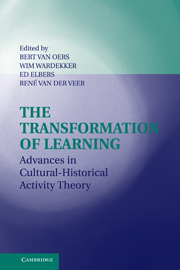Book contents
- Frontmatter
- Contents
- List of Contributors
- Preface
- INTRODUCTION
- SECTION ONE TENETS OF ACTIVITY THEORY
- SECTION TWO IDENTITY, DIVERSITY, AND INCLUSION
- Introduction to Section Two: Identity, Diversity, and Inclusion
- 9 Identity Shifts in Informal Learning Trajectories
- 10 No Human Being Is Illegal: Counteridentities in a Community of Undocumented Mexican Immigrants and Children
- 11 Cultural Identity and Emigration: A Study of the Construction of Discourse about Identity from Historical-Cultural Psychology
- 12 Diversity in the Construction of Modes of Collaboration in Multiethnic Classrooms: Continuity and Discontinuity of Cultural Scripts
- 13 “Discourse” in Cultural-Historical Perspective: Critical Discourse Analysis, CHAT, and the Study of Social Change
- 14 Reason and Dialogue in Education
- SECTION THREE DYNAMICS OF ACTIVITY AND THE VARIATIONS OF LEARNING
- Index
- References
14 - Reason and Dialogue in Education
Published online by Cambridge University Press: 25 August 2009
- Frontmatter
- Contents
- List of Contributors
- Preface
- INTRODUCTION
- SECTION ONE TENETS OF ACTIVITY THEORY
- SECTION TWO IDENTITY, DIVERSITY, AND INCLUSION
- Introduction to Section Two: Identity, Diversity, and Inclusion
- 9 Identity Shifts in Informal Learning Trajectories
- 10 No Human Being Is Illegal: Counteridentities in a Community of Undocumented Mexican Immigrants and Children
- 11 Cultural Identity and Emigration: A Study of the Construction of Discourse about Identity from Historical-Cultural Psychology
- 12 Diversity in the Construction of Modes of Collaboration in Multiethnic Classrooms: Continuity and Discontinuity of Cultural Scripts
- 13 “Discourse” in Cultural-Historical Perspective: Critical Discourse Analysis, CHAT, and the Study of Social Change
- 14 Reason and Dialogue in Education
- SECTION THREE DYNAMICS OF ACTIVITY AND THE VARIATIONS OF LEARNING
- Index
- References
Summary
A concern with reason has always been at the heart of European educational theory. For the ancient Greeks, reason was considered the defining characteristic of humanity. Both Aristotle and Plato argued that the promotion of reason should be a central aim of education. The movement for universal education that began in eighteenth-century France was at least in part inspired by the belief that education for all would expand the influence of reason in society and therefore fuel social progress. Harvey Siegel (1997) argues that thinking skills programmes are a continuation of this Enlightenment project to promote reason by means of education. Some “postmodernist” thinkers, such as Lyotard and Foucault, have strongly criticised this Enlightenment project. However most postmodern theory applied to education, when examined closely, does not involve a rejection of the ideal of reason so much as a redefinition of reason in terms of local dialogues (e.g., Parker, 1997). The important question is not so much, should education promote reason but, rather, which model of reason should it promote. In this chapter I tentatively put forward the suggestion that the idea of “dialogue across difference” (Burbules, 1993) offers a coherent model of reason that could serve as an ideal within education.
THE DIALOGIC TURN
Recently there has been an increasing number of studies in education and psychology informed by dialogical rather than monological theoretical assumptions.
Information
- Type
- Chapter
- Information
- The Transformation of LearningAdvances in Cultural-Historical Activity Theory, pp. 273 - 286Publisher: Cambridge University PressPrint publication year: 2008
References
Accessibility standard: Unknown
Why this information is here
This section outlines the accessibility features of this content - including support for screen readers, full keyboard navigation and high-contrast display options. This may not be relevant for you.Accessibility Information
- 13
- Cited by
